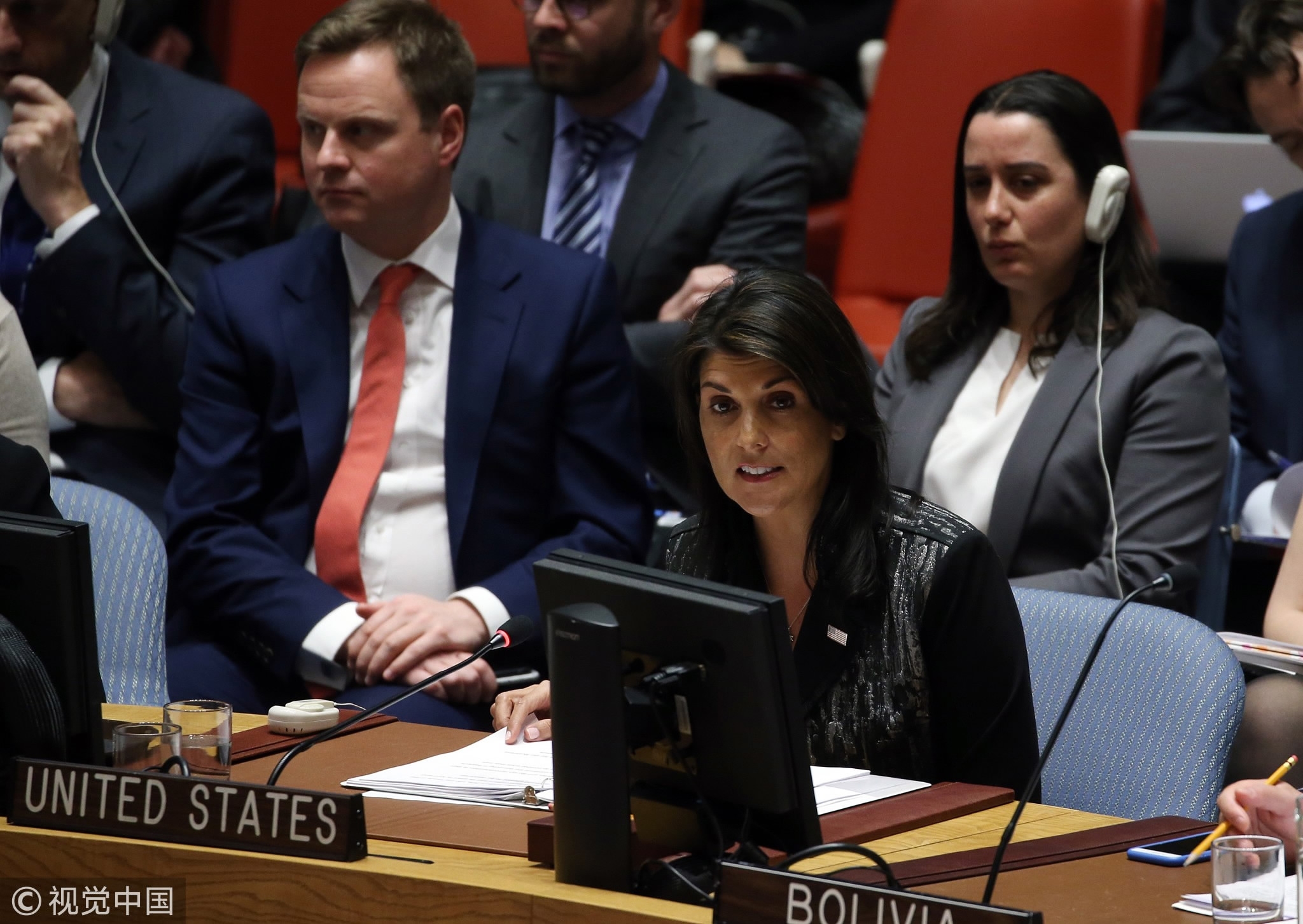
Opinions
21:25, 02-Apr-2018
Opinion: On Syria, Trump is acting like an unreliable ally for Israel and others
Guest commentary by Meir Javedanfar

The chances of war between Iran and Israel in Syria just increased – significantly.
This worrying development comes after President Trump announced on March 29 that “We'll be coming out of Syria, like, very soon.” According to at least one report, Trump has been privately telling his advisers the same over recent weeks. The fact that Trump also announced that he will be withholding 200 million US dollars worth of aid for the reconstruction of Syria is likely to convince more people that he means what he says on Syria.

Nikki Haley, US Ambassador to the United Nations, gives a speech during a UN Security Council meeting on Syria at United Nations Headquarters, March 27, 2018. /VCG Photo
Nikki Haley, US Ambassador to the United Nations, gives a speech during a UN Security Council meeting on Syria at United Nations Headquarters, March 27, 2018. /VCG Photo
Until now, Israel has been counting on the presence of US forces in Syria to counter the presence of pro-Iran forces in that country. If anything, there were hopes that the US would increase its presence in Syria. To suddenly hear the news that the US President wants the US to leave Syria means that a new consensus is likely to emerge in Israel. One which says: “Yet again, we are on our own. And yet again, we have to do the job ourselves.” Such a feeling has accompanied Israelis for years. A more recent example was in 2007 when Israel bombed the Syrian nuclear reactor just outside the city of Deir Azzor. Before Israel undertook this crucial military operation which could have had led to a devastating Syrian response (thankfully it didn’t), the former Israeli PM Ehud Olmert asked the then US President George W. Bush to bomb the facility instead. Bush, who was then mired in two wars in Iraq and Afghanistan refused, so the job was left to Israel.
But this time, Israel is not on its own: It has the Saudis and Emiratis on its side. Although Saudi Arabia and the United Arab Emirates do not have diplomatic relations with Israel, they too are worried about Iran’s growing presence in the region and that of its allies. And these countries are also likely to be shocked by the Trump announcement. And just like Israel, they are likely to feel that Trump could now leave them with Iran. Their only hope and that of Israel is that Trump’s advisers manage to change his mind. But if they fail, here again, just as the case of Israel and Iran in Syria, this new development is likely to radicalize the foreign policies of the UAE and the Saudis towards Iran.
This is likely to encompass the economy in the form of supporting tougher international sanctions against Iran. Furthermore, the Saudis and the UAE are likely to become even more uncompromising in their fight against the Houthis in Yemen as the Houthis are seen as Iran’s allies. Things could deteriorate even further if the Houthis, through their recent missile attacks against Saudi territory actually succeed and kill hundreds of Saudis in one of their attacks. As the prominent Saudi expert Bruce Reidel stated recently the realization of such a scenario “may only be a matter of time, in effect a ticking time bomb.”

A Syrian man, who was evacuated from former rebel-held towns in Eastern Ghouta, stands with a child between tents at a camp for displaced people in Kafr Lusin, between the town of Atmah and the Bab al-Hawa border crossing with Turkey, in Idlib Province, April 1, 2018. /VCG Photo
A Syrian man, who was evacuated from former rebel-held towns in Eastern Ghouta, stands with a child between tents at a camp for displaced people in Kafr Lusin, between the town of Atmah and the Bab al-Hawa border crossing with Turkey, in Idlib Province, April 1, 2018. /VCG Photo
At the same time, there will also be those who will welcome the departure of the US, as the latter is seen as an occupying power in the Middle East and is after the region’s oil. In fact, President Trump has stated openly that the US should have “kept Iraq’s oil” after occupying the country in 2003. There are also proponents of US staying in Syria because the current region in which the US forces are present is where almost all of Syria’s oil is. So why should the international community be worried about the departure of a foreign power such as the United States from Syria? You could ask.
The answer in this case relates to as many theories of seismology as it does of politics. Geo, representing geography, is the preceding part of the term geopolitics, and geography is impacted greatly by seismology. The latter which is taught at universities around the world is the “study of seismic waves, energy waves caused by rock suddenly breaking apart within the earth or the slipping of tectonic plates." We know these as events as earthquakes.
The removal of the one important superpower (ie. the United States) from the geopolitical landscape of the current Syrian war could cause a tectonic shift, which much as in real life could cause an earthquake, albeit this time a geopolitical one. And as mentioned, one of the consequences could be a clash between the two opposing sides in Syria: Iran and Israel as well as increasing tensions between Iran and the Saudis.
And with Trump pulling militarily out of Syria thus handing Iran a victory, Israel and Saudi Arabia will become concerned as to whether he is a reliable ally who would accompany them in the tense and dangerous times which are likely to follow once he withdraws from the Iran nuclear deal.
(Meir Javedanfar is a Middle East analyst. He teaches at the Interdisciplinary Center (IDC) in Herzliya, Israel and is a research fellow at the Meir Ezri Center for Persian Gulf studies at Haifa University in Israel. The article reflects the author’s opinion, and not necessarily the views of CGTN.)

SITEMAP
Copyright © 2018 CGTN. Beijing ICP prepared NO.16065310-3
Copyright © 2018 CGTN. Beijing ICP prepared NO.16065310-3